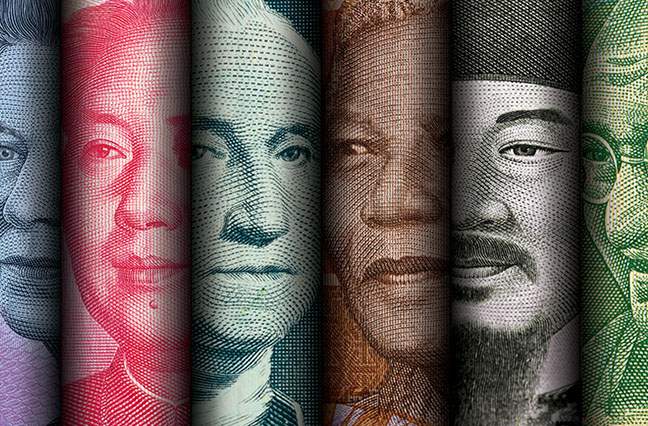
The Trading Game

Big money is being invested in projects that aim to facilitate trade flows into and out of various parts of the world. The World Bank says it spends tens of millions of dollars every year to encourage private and public sector-led trade flows because it results in new investment activity.
But with cross-border investment comes a new set of risks. Just ask Evan Chuck.
A partner with the St. Louis–based law firm of Bryan Cave Leighton Paisner, Chuck says it’s vital to analyze the real-world situation facing U.S. companies. Chuck, Bryan Cave’s chief legal representative and Shanghai office liaison, emphasizes the firm’s experience in dealing with export insurance, particularly in the context of U.S. buyers of Chinese goods. “Increasingly,” he says, “Chinese exporters use their export insurance as a sword against U.S. and foreign buyers. Particularly in pay disputes, Chinese exporters frequently threaten that they will file a claim with their Chinese insurance provider to make them whole for the amount they were expecting. This also can have the effect of putting the non-Chinese buyer on a blacklist, effectively shutting them out of the Chinese market. This puts enormous pressure on the non-Chinese buyer to negotiate a settlement with the Chinese party.”
Chuck also points out that typical commercial policies trying to cover risk in China may have “real-life” deficiencies in that the quasi-governmental nature of some bodies in China may make it difficult to determine whether “expropriation” has occurred (usually excluded from ordinary commercial insurance). “In recent years,” he says, “there have been disputes over coverage when, in China, a factory is abandoned by a foreign landlord, resulting in labor unrest that requires the intervention of the Chinese social stability agency. That agency may seize assets and try to organize their sell-off to pay liabilities. Whether such situations are covered has been the source of complex insurance negotiations and litigation.”
While regulatory uncertainty and different trade practices may plague investors in China, financial and other crises across the globe underscore the persistent risk of international trade.
In May 2017, the government of Laos revoked concessions for 15 mining operations after investors failed to implement their projects as agreed. Defaulting on government obligations is one of five recent investor experiences in cross-border transactions. The others are the repossession of privatized assets; the revocation of concessions given by previous governments; the inability to convert or transfer local or foreign currency due to government action or inaction; and contract frustration due to inadequate legal and regulatory frameworks.
Companies that pursue international trade opportunities and/or international investments can derive real benefits from both trade credit insurance (TCI) and political risk insurance (PRI). Both are not only easy to secure but are also affordable. In fact, many consider them to be vital tools for companies engaged in international trade.
“We have noticed an upturn in demand for a combination of TCI and PRI insurance products,” says Michael Sullo, commercial-lines damage insurance broker and trade credit specialist at BFL CANADA. “Where there is instability, there is concern. Where there is concern, there tends to be caution. With increasing political uncertainty on the horizon and disruptions between Canada and the U.S., it is no surprise that businesses are seeking shelter from potential payment issues, which could be triggered by political events.”
Trade Credit Insurance
TCI is a proven product whose history in supporting trade dates back over 100 years. TCI insures manufacturers, traders and providers of services against the risk that their buyer does not pay (after bankruptcy or insolvency) or pays very late.
Suppliers who deliver goods and/or services on credit have to manage this credit risk to ensure that payment is received on time. Outstanding receivables are usually the largest or second-largest item on a trading company’s balance sheet. Bad debt losses affect liquidity and profits. Even worse, they might cause a company’s ultimate financial ruin. By insuring these receivables against non-payment or late payments, the company ensures its cash flow and its profit.
The value of TCI was demonstrated during the recent global financial crisis. This period saw insured manufacturers and traders reimbursed for their losses on defaulting buyers. In 2008 and 2009, the industry paid out claims to insured policyholders totaling more than €9 billion (US$10.4 billion). Many of them would not have survived without their TCI compensation.
Many of the most active insurers that cover the market today were established between 1925 and 1946. TCI has had wide market acceptance in the United States for more than 25 years and in Western Europe for more than 50 years. There are two primary sources of trade credit insurance: private sector insurance companies and the federal government.
The three largest and oldest private insurers—Euler Hermes, Coface and Atradius—are based in Europe, where the trade credit insurance market developed much earlier and more rapidly. Given the size of most European countries, combined with their political and legal systems, companies there were forced to develop their export business to fuel sales growth much sooner than their U.S. counterparts.
TCI developed because of the special challenges facing exporters. The list is a long one, but here are the six biggest challenges:
- The buyer and seller don’t know each other
- Different languages, customs, laws and regulations
- The cost and terms of bank finance
- The buyer wants time to pay
- The seller wants immediate payment
- The transfer/payment is done in a foreign currency.
In today’s marketplace, companies sell to international buyers and face competition from suppliers across the globe. A company must offer competitive terms to vie for business against foreign players. Banks lend more capital against insured receivables and usually do so with better financing terms since they can transfer the payment risk to the insurance company. This type of insurance also offers release for intercompany credit facilities.
“An important factor, which is also a huge benefit to exporters, is the bankability of the TCI product,” Sullo says. “Lenders will typically exclude export receivables from the borrowing base, which is a limiting factor for companies requiring additional working capital in order to fuel export growth. By insuring these export receivables, lenders can include this asset up to 90% in the borrowing base. This is a huge opportunity for exporters to take full advantage of this underleveraged asset.”
The TCI market has evolved and expanded, and there are now several private insurance players offering many alternatives to companies. Every credit insurer has three primary missions: prevent and control the inability of customers to meet their financial obligations; indemnify up to 90%; and recover unpaid invoices. A good TCI policy pays a percentage of the outstanding debt, usually ranging from 75% to 95% of the invoiced amount. But the payout may be higher or lower, depending upon the type of cover that was purchased.
Any company is eligible for TCI coverage. The companies that benefit the most from TCI include firms with limited fixed assets, those that require more efficient debtor management, those experiencing rapid growth and those that offer longer payment terms to their customers.
In the absence of TCI, many transactions need to be consummated on a prepaid or cash basis or they might not happen at all. This is why TCI is such an essential credit management tool. And this is why it’s used to control risks, improve payment behavior, obtain vital buyer information, and monitor exposures. “In most cases, without a combination of TCI/PRI in place, exporters would typically transact via L/Cs [letters of credit], upfront payment or very restrictive terms of sales, giving them less of a competitive edge in foreign markets,” Sullo says.
In fact, many consider a company’s executives to be legally obligated to use TCI. It’s also one key factor the major rating agencies consider when they assess companies. The agencies view measures taken to mitigate credit risk in a very positive light.
Political Risk Insurance
When the TCI market began to grow following World War I and the Great Depression, the private market was not willing to cover political risk. In order to fill this need, many countries formed export credit agencies (ECAs). “Most of the countries in the world have their own ECAs to cover political risk—what the private market was not able or willing to cover,” says Xavier Monsaingeon, director of Platus, a TCI- and PRI-focused subsidiary of Verspieren Group. “It became a tool for the countries to support the exports of their nationals.
“In the ’70s, the private market started to reconsider political risk insurance…. Today, the market has hugely grown up, and there are now probably between 50 and 60 players who have now become involved in private PRI in competition with credit export agencies all over the world.”
Monsaingeon says the private market has the size and financial strength to compete and collaborate with the other market players. “When we syndicate the risk among various players we can find capacity for up to $1 billion U.S.,” he says, “so it means that they are capable of providing significant things.” Monsaingeon says this is also why the export credit agencies, the Multilateral Investment Guarantee Agency and the African Trade Insurance Agency not only compete but cooperate with the private market. “Insurers like to share the risks,” Monsaingeon says.
PRI covers those events, actions or omissions of a government that are outside the control of the parties to a commercial transaction. PRI coverage excludes force majeure events, currency depreciation or devaluation, events in the control of a party in the commercial transaction or lawful actions of a government. Trade and investment activities covered by PRI include equity and quasi-equity, shareholder loans and loan guarantees, and commercial loans, among others.
Government Policies
U.S. Ex-Im Bank looks for revival under Trump.
The Export-Import Bank of the United States (Ex-Im), the official export credit agency of the United States, offers export-only insurance policies that carry the full faith and credit of the U.S. government.
The Ex-Im Bank’s insurance programs require that transactions meet certain criteria to be eligible for Ex-Im coverage.
- More than 50% of the product’s total cost must be U.S. content.
- The shipment must be to a buyer located outside the United States.
- The payment obligation must be with a foreign-based buyer.
- The export product cannot be sold to a military or quasi-military buyer.
Like most export credit agencies, the Ex-Im Bank tends to provide coverage in difficult markets where the private insurance market is unwilling or unable to do so. The Ex-Im Bank has seen some controversy over the years, including lacking conservative Republican support and enough board members for a quorum needed to finance larger deals in recent years. But in June, the Trump administration nominated a new head, Kimberly Reed, who, if confirmed, may breathe new life into the bank.
That said, one of Ex-Im’s important initiatives is to support small business exporters. And the benefits flowing to those small businesses that use the bank are evident in many sectors of the U.S. economy. Consider the story of Collection 2000 Corp., a longtime Ex-Im customer, as told by the bank.
[Collection 2000] used Multi-Buyer Export Credit Insurance to send dozens of shipments to foreign buyers. This insurance policy allowed them to sell to customers in many different countries, mitigating the risk of nonpayment, while equipping them to provide their customers open account terms. Then it happened. Collection 2000 shipped more than $100,000 worth of products to a longtime customer in Trinidad and Tobago. Up until that point, the buyer had always been diligent about paying on time. As with previous orders, the buyer was given 60-day credit terms. However, the invoice due date came and went, and the payment never arrived. Collection 2000 made several attempts to contact the buyer to collect the outstanding debt to no avail. The buyer kept saying it would wire the funds the next day but never transferred the payment as promised. In a last-ditch effort to collect the payment, Collection 2000 commissioned a law firm to follow up with the buyer one last time. With the invoice four months past due, Collection 2000 filed a claim with Ex-Im. Through Ex-Im’s policy, Collection 2000’s invoiced amount was covered at 95 % against buyer default, with no deductible. After carefully assessing the situation and reviewing the supporting documents, Ex-Im approved and paid Collection 2000’s claim in June 2014, less than a month after filing.
PRI enhances a project’s financial viability by transferring political risks from the control of the parties associated with the project to a third party, which is better able to bear the risks through specialized knowledge and portfolio diversification. Further, the third party possesses the expertise needed to share the risks through the use of reinsurance. PRI reduces the degree of risk, and the cost of capital is lowered. This is achieved by lengthening the term of the borrowing, reducing the capital charge (and thus the loan margin) and potentially the amount of debt provided.
Mike O’Malley, the senior vice president of public policy at the American Insurance Association, says more companies and investors should consider political risk insurance to protect their overseas investments. “Because this specialty product can and should be tailored to fit a client’s unique exposures, AIA has been actively encouraging the states to exempt this line of business from policy form and rate filings,” O’Malley says. “Our hope is that, through such commercial lines modernization efforts, the market for political risk insurance will expand as more contractors, importers and exporters, financial institutions and investors routinely request quotes for this important coverage.”
Sullo adds that products like TCI and PRI play a vital role in global trade and in promoting export growth. “If we look at Canadian companies who export their goods abroad, a combination of TCI/PRI can help gain insight on potential export markets, prospective clients, potential long-term investment partners and can also allow for more favorable terms of sale to foreign buyers.”
Growth in Africa
To see insurance-fueled growth at work, turn to Africa, home of one of the fastest-growing economies in the world. The World Bank’s leading project created a financial facility that pools the capital contributed by African governments through their subscription in the share capital of the Africa Trade Insurance Agency (ATI). These funds enable ATI to underwrite insurance policies to cover short-term to medium-term political risk as well as three other conditions: comprehensive credit insurance for private-sector buyers; the non-honoring of sovereign obligations (covering loans against losses resulting from a government’s failure to make a payment under a guarantee); and trade cover for sub-sovereign obligors, wherein a local or state-level government entity is the obligated party (as bond issuer, borrower, debtor, insurer, etc.) to repay a debt.
In addition, the financing issued by ATI can be used to fund eligible investments and share repurchases and to make insurance facility-related payments.
According to its founding document, ATI was established at the initiative of the Common Market for Eastern and Southern Africa (COMESA) to “[f]acilitate private sector-led trade flows, investment and ‘productive activities’ through the provision of insurance, coinsurance and reinsurance, financial instruments and related services.” COMESA, headquartered in Zambia, was created as an organization of sovereign states that agreed to cooperate in developing their natural and human resources for the good of all their people and to promote sustainable economic development. In this context, the main focus of COMESA has been on the formation of a large economic and trading unit to overcome trade barriers faced by individual states.
The rationale behind the founding of ATI was straightforward: the relatively small volumes of trade and investment in many ATI member states do not merit the establishment of national insurers. ATI helps reduce the cost associated with doing business in Africa by offering five types of solutions:
- Cost-effective use of underwriting capital
- Reduced overhead costs
- Regional integration through international cooperation and risk sharing
- Enhanced possibilities for risk diversification by creating a regional risk portfolio (reducing the impact of an individual country’s volatilities and sector dependencies)
- Encouraging private sector insurers to assume risk in Africa.
ATI is owned by the African governments that signed the charter and subscribed to the share capital. (Although ATI is open to all member states of the African Union, not all of them have joined.) ATI is supported by the World Bank and partners with Lloyd’s of London and other major private insurance companies and with private and public credit insurers.
ATI’s multilateral status—as well as the strong support it enjoys from the World Bank—creates a very powerful deterrent for any country to leave ATI in the lurch for a loss. In other words, there’s an underlying country obligation to make ATI whole for any political risk losses the government might cause. Governments worry that, by creating an incident that would require insurance to be paid, the international organizations behind ATI would, in turn, hesitate or even cease doing business in that country—a bad outcome for an economy hungry for capital. Plus, having invested directly in ATI’s capital means member states enhance ATI’s ability to resolve disputes without loss.
As shareholders of ATI, member states also have a vested interest in maintaining the investment environment and ensuring that disputes are resolved. Multilateral insurers such as ATI act as neutral parties between the investor and the host government to ensure that investments stay on track.
Growing Global
When a company ventures into international markets or sets out to grow within those markets, one factor that can help differentiate success from failure gets little attention: it’s the courage to make an honest assessment of risk factors, which means analyzing the costs of mitigation and then implementing active risk management strategies.
Investing in Emerging Economies
A World Bank case study in insurance-driven investment.
This case study includes excerpts from a World Bank brief on the Multilateral Investment Guarantee Agency, also authored by Gordon Feller. —Editor
As with cross-border investments in many business sectors, there are non-commercial risks associated with manufacturing projects, especially in emerging economies. Despite the best intentions and thorough planning, unforeseen events can disrupt a project.
Newly stabilized governments could still be sitting on shaky political ground. Unclear or incomplete laws—on property ownership, for example—can obscure the profit-making picture. Investors may be worried about potential government takeover of land or assets. Restrictions on revenue repatriation could complicate a project’s finances even more, exacerbating imbalances between foreign-denominated debt and locally denominated revenues. Lastly, threats such as revolution or terrorism add an additional layer of uncertainty, potentially derailing even the most promising of investments. Combined, such political risks contribute to high costs of capital. Some lenders might not be willing to lend at all in the absence of political risk insurance policies.
Consider one example in which the World Bank’s key insurance agency, the Washington, D.C.–based Multilateral Investment Guarantee Agency (MIGA), provided much-needed coverage. Corona Group, a leading sanitary wares manufacturer in the Americas, acquired a majority-stake in Incesa Nicaragua, along with the rights to registered trademarks in the region. Founded in 1957, Incesa produces, imports and distributes a broad portfolio of sanitary ware, showers, faucets, furniture and accessories marketed under two brands: American Standard and Incesa Standard. The agency provided a guarantee of $11 million, covering Corona Group’s equity investment in Incesa as well as the trademark license, while covering the project against the risks of transfer restriction, expropriation and war and civil disturbance. This was the first time MIGA covered a trademark license as a non-equity direct investment. The project involved the transfer of a set of technologies to improve production processes, increase the plant’s competitiveness and introduce product innovations in the market. It will benefit from continuous managerial, technical, logistical and marketing support from the Corona Group.
MIGA derives its strength from its standing as a member of the World Bank Group and its structure as an international organization with shareholders including most countries of the world. The agency provides political risk insurance guarantees to private sector investors and lenders. Since its inception in 1988, MIGA has issued more than $28 billion in political risk insurance for projects in a wide variety of sectors covering all regions of the world.
The agency’s guarantees are designed to mitigate the non-commercial risks associated with manufacturing projects in emerging markets, thereby lowering the cost of capital. They can also reassure lenders their investments are protected. The agency helps equity owners engaged in costly investments in countries often seen (for good reason) as high risk.
“As brokers, it is important for us to discuss these solutions in a proactive way with clients,” Sullo says. “In this context, it definitely creates opportunities for serious dialogue about these insurance products and the value they can bring. These insurance products are definitely weapons to wield with a potential trade war looming and should be a part of every exporter’s credit management arsenal.”
The company that ignores these kinds of tools will only have itself to blame when competitors move into those markets, grab customers and reduce their risks. When 95% of the world’s purchasing power lies outside the United States, smart business leaders must look outward to see what it takes to grow globally.
“I remember 10 years ago, people were thinking classical war was over—with weapons and the shells coming from one side to the other—but unfortunately, it still exists,” Monsaingeon says. “Countries such as Libya, for example, were considered very stable thanks to a very strong dictator, and the dictator disappeared in two weeks’ time. On the other hand, there are countries where everyone says, ‘This country will explode next week.’ As a broker, I just have to try to get the widest possible coverage because we don’t know what will happen.”
Feller is a contributing writer. [email protected]




